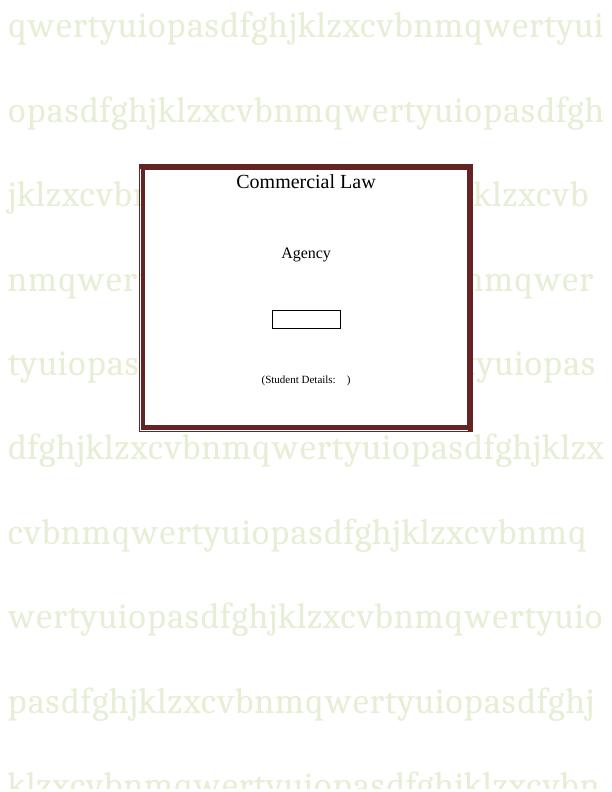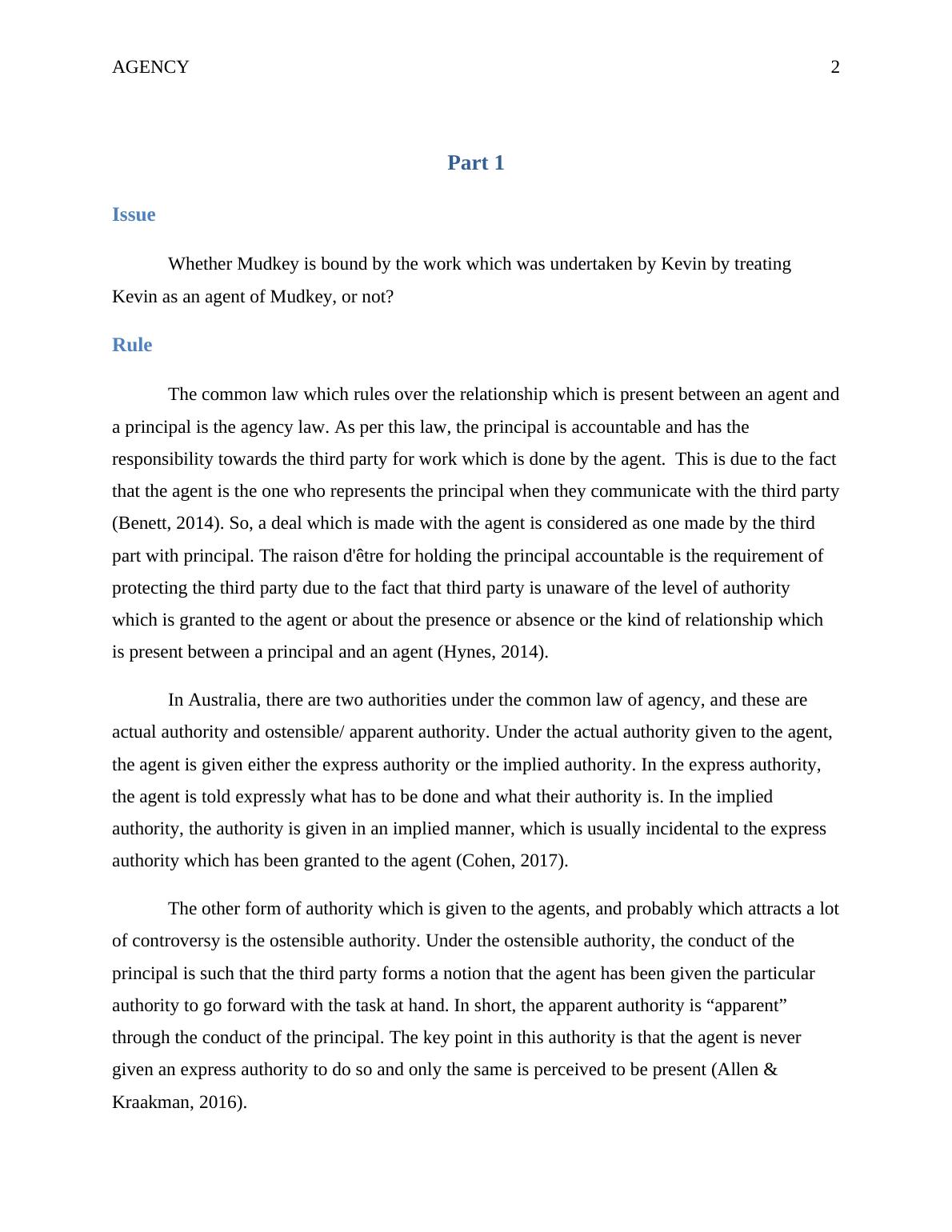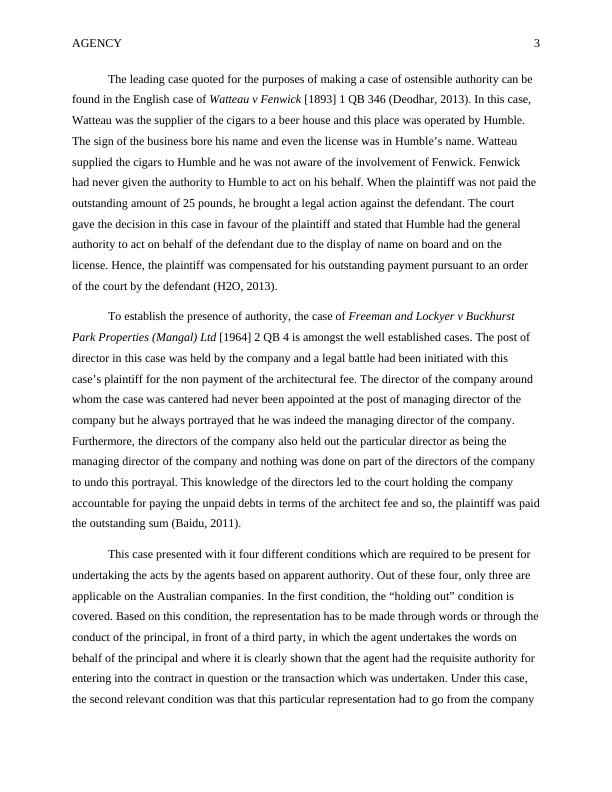Agency Law and Common Law Assignment
Added on 2020-03-23
8 Pages2684 Words57 Views
qwertyuiopasdfghjklzxcvbnmqwertyuiopasdfghjklzxcvbnmqwertyuiopasdfghjklzxcvbnmqwertyuiopasdfghjklzxcvbnmqwertyuiopasdfghjklzxcvbnmqwertyuiopasdfghjklzxcvbnmqwertyuiopasdfghjklzxcvbnmqwertyuiopasdfghjklzxcvbnmqwertyuiopasdfghjklzxcvbnmqwertyuiopasdfghjklzxcvbnmqwertyuiopasdfghjklzxcvbnmqwertyuiopasdfghjklzxcvbnmqwertyuiopasdfghjklzxcvbnCommercial LawAgency(Student Details: )

AGENCY2Part 1IssueWhether Mudkey is bound by the work which was undertaken by Kevin by treating Kevin as an agent of Mudkey, or not?RuleThe common law which rules over the relationship which is present between an agent anda principal is the agency law. As per this law, the principal is accountable and has the responsibility towards the third party for work which is done by the agent. This is due to the factthat the agent is the one who represents the principal when they communicate with the third party(Benett, 2014). So, a deal which is made with the agent is considered as one made by the third part with principal. The raison d'être for holding the principal accountable is the requirement of protecting the third party due to the fact that third party is unaware of the level of authority which is granted to the agent or about the presence or absence or the kind of relationship which is present between a principal and an agent (Hynes, 2014). In Australia, there are two authorities under the common law of agency, and these are actual authority and ostensible/ apparent authority. Under the actual authority given to the agent, the agent is given either the express authority or the implied authority. In the express authority, the agent is told expressly what has to be done and what their authority is. In the implied authority, the authority is given in an implied manner, which is usually incidental to the express authority which has been granted to the agent (Cohen, 2017). The other form of authority which is given to the agents, and probably which attracts a lotof controversy is the ostensible authority. Under the ostensible authority, the conduct of the principal is such that the third party forms a notion that the agent has been given the particular authority to go forward with the task at hand. In short, the apparent authority is “apparent” through the conduct of the principal. The key point in this authority is that the agent is never given an express authority to do so and only the same is perceived to be present (Allen & Kraakman, 2016).

AGENCY3The leading case quoted for the purposes of making a case of ostensible authority can be found in the English case of Watteau v Fenwick [1893] 1 QB 346 (Deodhar, 2013). In this case, Watteau was the supplier of the cigars to a beer house and this place was operated by Humble. The sign of the business bore his name and even the license was in Humble’s name. Watteau supplied the cigars to Humble and he was not aware of the involvement of Fenwick. Fenwick had never given the authority to Humble to act on his behalf. When the plaintiff was not paid the outstanding amount of 25 pounds, he brought a legal action against the defendant. The court gave the decision in this case in favour of the plaintiff and stated that Humble had the general authority to act on behalf of the defendant due to the display of name on board and on the license. Hence, the plaintiff was compensated for his outstanding payment pursuant to an order of the court by the defendant (H2O, 2013).To establish the presence of authority, the case of Freeman and Lockyer v Buckhurst Park Properties (Mangal) Ltd [1964] 2 QB 4 is amongst the well established cases. The post of director in this case was held by the company and a legal battle had been initiated with this case’s plaintiff for the non payment of the architectural fee. The director of the company around whom the case was cantered had never been appointed at the post of managing director of the company but he always portrayed that he was indeed the managing director of the company. Furthermore, the directors of the company also held out the particular director as being the managing director of the company and nothing was done on part of the directors of the company to undo this portrayal. This knowledge of the directors led to the court holding the company accountable for paying the unpaid debts in terms of the architect fee and so, the plaintiff was paidthe outstanding sum (Baidu, 2011).This case presented with it four different conditions which are required to be present for undertaking the acts by the agents based on apparent authority. Out of these four, only three are applicable on the Australian companies. In the first condition, the “holding out” condition is covered. Based on this condition, the representation has to be made through words or through theconduct of the principal, in front of a third party, in which the agent undertakes the words on behalf of the principal and where it is clearly shown that the agent had the requisite authority for entering into the contract in question or the transaction which was undertaken. Under this case, the second relevant condition was that this particular representation had to go from the company

End of preview
Want to access all the pages? Upload your documents or become a member.
Related Documents
BULAW1503 Commercial Law and Agency Law Assignmentlg...
|11
|2739
|199
Business Law: Authority and Liability in Agency Relationships and Corporate Lawlg...
|9
|2191
|294
Business Law for People in Businesslg...
|10
|2258
|65
The Assignment on Business and Corporation Lawlg...
|12
|2994
|20
Commercial and Corporation Lawlg...
|8
|2390
|79
Corporation Law: Liability of Agents and Lifting of Corporate Veillg...
|9
|2389
|364
